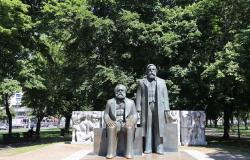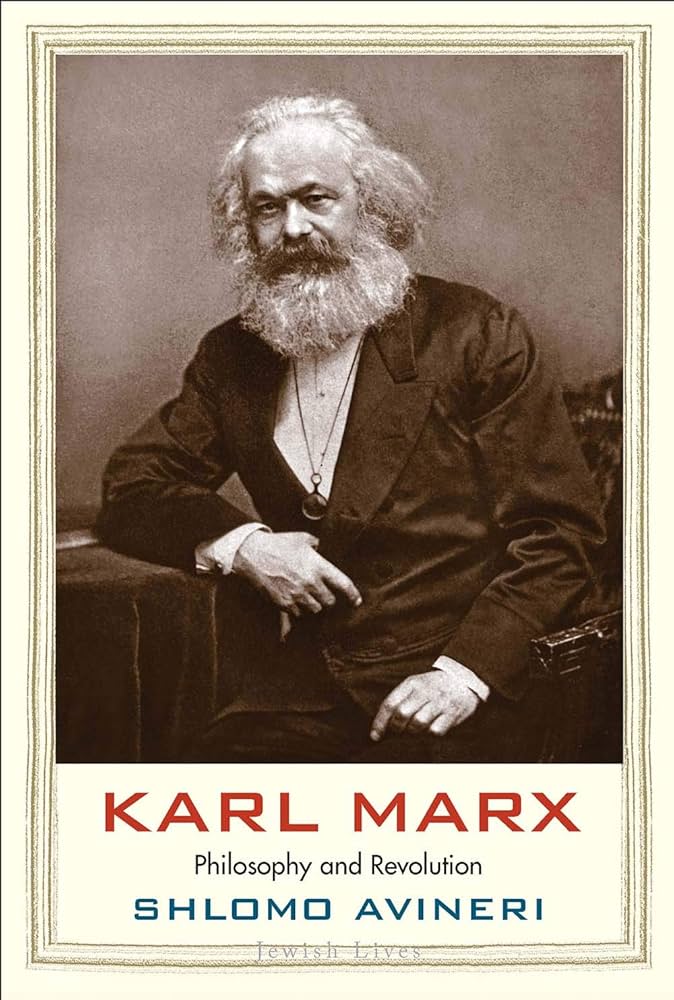Marx Truncated

Shlomo Avineri’s Karl Marx: Philosophy and Revolution is an excellent introduction to some parts of Marx’s philosophy, but a very truncated book as far as other parts of Marx’s work and biography are concerned.
Marx’s Jewishness. Avineri’s book is part of a series about Jewish lives published by Yale University Press. The book thus needs to address, as far as possible, topics which have to do with Marx and Jewish lives and customs. These are however very limited because Marx’s Jewish origins played almost no role in his life or oeuvre. As Avineri writes “Marx cannot be seen as a ‘Jewish thinker’, and his knowledge of matters Jewish was minimal” (p. x); “Marx was totally ignorant [of Jewish religious practices], never having either experienced them directly or independently studied them” (p. 45).
One would not be able to write a book on Marx and Jewishness simply because such a book would consist of only a couple of pages. The most important part of such a book would deal, as indeed Avineri does, with Marx’s youthful essay On the Jewish Question. The essay has two parts. The first part calls, very liberally, for the emancipation of the Jews regardless of religion; it thus takes a position against conversion as the condition for civic emancipation (written in opposition to the view favored by another Young Hegelian, Moses Hess). The second part of the essay is seen by some as even anti-Semitic because it discusses the connection between Jews, or more broadly “Jewishness” (Judentum), and capitalism. Avineri rightly rejects the anti-Semitic interpretation while mentioning that Marx’s essay was not published in Hebrew until 1965.
 The Young Hegelian. The second important topic is what is called today “the young Marx”. There Avineri draws on his excellent book published in 1968 “The social and political thought of Karl Marx”. The chapters about Marx transcending Hagel’s thought and his formative years in Paris and Brussels summarize the views expounded by Avineri in 1968: Marx’s redefinition of materialism, influence of Feuerbach, the publication (together with Engels) of The Communist Manifesto and debates within the circle of the Young Hegelians. It is there that Avineri goes over texts published sixty or even one hundred years after they were written, such as Economic and Philosophic Manuscripts of 1844, The German Ideology, The Holy Family etc. For all of them Avineri provides an excellent introduction and discussion.
The Young Hegelian. The second important topic is what is called today “the young Marx”. There Avineri draws on his excellent book published in 1968 “The social and political thought of Karl Marx”. The chapters about Marx transcending Hagel’s thought and his formative years in Paris and Brussels summarize the views expounded by Avineri in 1968: Marx’s redefinition of materialism, influence of Feuerbach, the publication (together with Engels) of The Communist Manifesto and debates within the circle of the Young Hegelians. It is there that Avineri goes over texts published sixty or even one hundred years after they were written, such as Economic and Philosophic Manuscripts of 1844, The German Ideology, The Holy Family etc. For all of them Avineri provides an excellent introduction and discussion.
Marx as an economist. There is a clear dearth of discussion of the mature Marx who in many peoples’ opinions is associated with the critique of the political economy. In fact, somebody ignorant of Marx’s writings and background could have believed, reading Avineri’s book, that Marx’s writings ceased around 1848 or 1850. The next twenty years are discussed most cursorily. It is remarkable that the second and third volume of Capital (together more than 1,000 pages long) are dealt in half a sentence. The first volume of Capital is treated only as far as the first couple of chapters concerned with the definition of commodity and commodity fetishism. One would in vain search for even the definition of such crucial Marxist terms as the reserve army of labor, deskilling of labor, creative destruction, the tendency of the profit rate to fall, the (rejection of the) iron law of wages, the definition of the modes of production, under-consumptionism, the balanced growth of the three departments, the minimum wage as a historical category...and one could go on. It seems that Avineri was not conversant with Marx as an economist and therefore that entire part of his work is simply left out.
Marx as a “sanitized” liberal. In The social and political thought of Karl Marx Avineri skillfully tried to present Marx as a liberal, or at most, a social-democratic West European thinker. The same approach is followed here, but in a much cruder form, by arbitrary exclusions or inclusions of different “pieces” of Marx. Avineri makes the same mistake of which he accuses the proponents of the “revolutionary” interpretation of the political Marx. He generalizes from a couple (literally, a couple) of observations that Marx made regarding the possibility of peaceful transition to socialism in the politically developed countries like Great Britain, the United States and the Netherlands, to claiming that it was Marx’s general approach to the transition to socialism. This requires Avineri to downplay or simply ignore many writings including very significantly Marx’s writings about the US Civil War where Marx argued in favor of violent suppression of an inferior socio-economic formation; Irish and Polish rebellions, both supported by Marx; the Paris Commune, with whose policies Marx almost totally identified in his Civil War in France; and the critique of the Gotha program. Avineri fails to mention most of these writings, or claims, in the case of the Paris commune, that Marx was in private notes written while the Commune was going on critical of the “prise de pouvoir” by the Communards but later, after the Commune was brutally crushed, took the opposite view, in favor of whatever Commune has done. This is a strange interpretation: greater importance is given to unpublished remarks, many of them not even letters but mere notes, rather than to the published book. Similarly, Avineri discounts almost entirely The Critique of the Gotha Program and all of Marx’s statements which allow, or even call for, the use of force to further the transition from capitalism to socialism.
This “liberal” Marx is then used to argue that Lenin and Leninism falsified Marx. The argument is difficult to defend given Marx’s writings and their internal logic. Further, Avineri does not seem to realize that without the Bolshevik revolution it is most likely that Marx would have been rather forgotten thinker, just one of the many also-rans of German social-democracy, and most of his writings (including practically all that Avineri discusses in the first part of his book) would not have been published. So, Marx’s fame depended on this type of interpretation that supported for a transition to socialism in the less developed societies and in a violent way.
The post-Capital Marx. This part of Marx’s writings (post-1867) is all but ignored. This is unfortunate because the last period of his life is in many respects the most interesting for us today because it is then that Marx faced for the first time the problem of capitalist globalization and the question of whether his unilinear scheme of different social formations neatly succeeding each other, based on West European experience, holds for the rest of the world etc. Avineri discussed this very briefly—almost dismissively briefly—through Marx’s relationship with Russian Marxists but does not go any further than that. Books by Kevin B. Anderson Marx at the Margins (reviewed here) or Marcelo Musto’s The Last Years of Karl Marx (reviewed here) are much more informative on this period.
The lasting influence. In the conclusion, Avineri contrasts the enormous influence that Marx has had on practically all social sciences, comparing him with Plato, and the diminishing relevance of his political program. Both observations are correct with one proviso, however. That proviso comes from an extremely interesting analysis by Avineri of the ten economic policies advocated by Marx and Engels in the Communist Manifesto. When one reads Avineri’s sophisticated interpretation of the connections between these policies (Chapter 5) it soon becomes apparent that the country coming closest to having implemented them is….China. For example, Avineri argues that the ten policies of the Manifesto imply a gradual increase of the importance of the state but not an immediate abolition of private property rights. If indeed such interpretation is correct, and if China comes closest to having applied these principles, and given that China’s development in the past fifty years is the most successful development of any country over that period, then the practical importance of Marx’s thought is much greater than what we think. Avineri’s own reasoning may be used to undermine his conclusions.
This first appeared on Branko's blog.
Photo by Mariia Photographer


